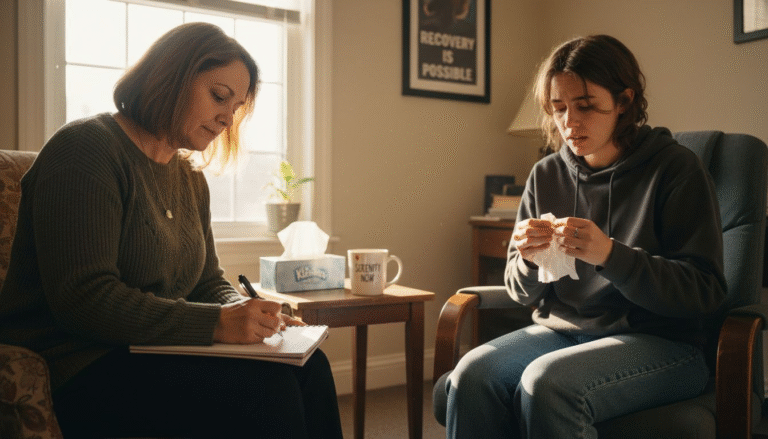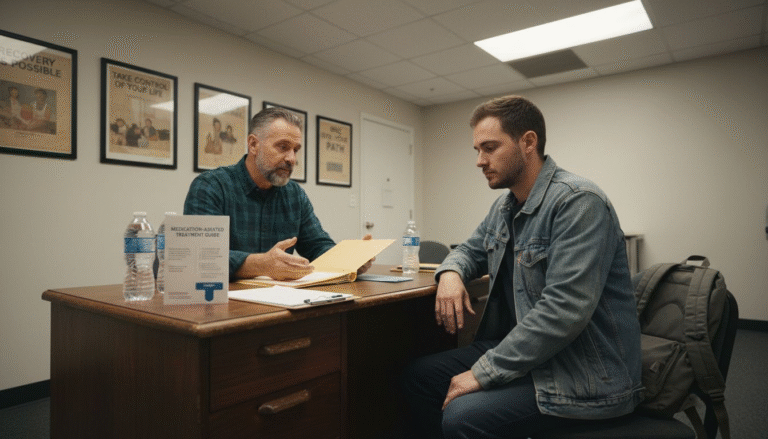Did you know that nearly 90 percent of people seeking addiction help prefer treatment options that fit around their daily lives? Flexible outpatient programs are changing the way recovery works, making it possible to heal while keeping up with work, school, and family. By offering real support without turning your world upside down, these programs deliver lasting solutions that match your unique needs and routine.
Quick Summary
| Takeaway | Explanation |
|---|---|
| 1. Flexible scheduling allows treatment integration. | Outpatient programs are designed to fit into your daily life, accommodating work, school, and family commitments for ongoing recovery. |
| 2. Family and social support enhances recovery. | Outpatient treatment encourages family involvement and connections to peers, creating a supportive network essential for successful rehabilitation. |
| 3. Cost-effective treatment options available. | Outpatient programs generally cost less than residential ones, reducing financial burdens while allowing continued employment during treatment. |
| 4. Customized care plans for individual needs. | Each recovery journey is unique; outpatient programs provide personalized strategies tailored to your specific challenges and circumstances. |
| 5. Facilitated community resource connections. | These programs link you to local support networks, enhancing recovery through access to workshops, training, and other community resources. |
Table of Contents
- Flexible Scheduling For Busy Lifestyles
- Access To Ongoing Family And Social Support
- Cost-Effective Treatment Options
- Ability To Maintain Work Or School
- Personalized And Individual Care Plans
- Smooth Transition From Intensive Programs
- Strong Connection To Local Community Resources
1. Flexible Scheduling for Busy Lifestyles
Recovery doesn’t have to interrupt your life. Outpatient programs offer treatment options that work around your existing commitments, allowing you to pursue healing without sacrificing your professional or personal responsibilities.
Traditional addiction treatment often meant taking extended time away from work or family. Now, modern outpatient programs recognize that real recovery happens when treatment integrates seamlessly into your daily routine. According to Better Addiction Care, these programs provide therapy times that accommodate work, school, and family obligations while ensuring consistent treatment.
What does flexible scheduling really look like? Most outpatient programs now offer multiple treatment time windows, including:
- Morning sessions before work
- Evening classes after professional hours
- Weekend appointments for maximum accessibility
- Online telehealth options for remote participation
This approach allows you to maintain your job, continue supporting your family, and pursue your educational goals while simultaneously addressing substance use challenges. As Another Chance Rehab notes, the goal is minimizing disruption to your personal and professional life.
Practically speaking, flexible scheduling means you can design a recovery path that feels sustainable. Instead of feeling overwhelmed by treatment requirements, you gain a supportive framework that adapts to your unique lifestyle. Your commitment to recovery becomes a collaborative process that respects your existing commitments.
Ready to explore a treatment approach that fits your life? Contact our admissions team to discuss personalized outpatient scheduling options.
2. Access to Ongoing Family and Social Support
Recovery is not a solitary journey. Outpatient treatment creates a powerful network of support that extends beyond professional therapy, keeping you connected to the people who matter most during your healing process.
Unlike residential programs that temporarily remove you from your social environment, outpatient treatment allows you to remain deeply integrated with your family and community support system. Better Addiction Care highlights that staying at home enables sustained encouragement from loved ones throughout the recovery journey.
Family involvement becomes a critical component of successful rehabilitation. Outpatient programs actively encourage family therapy and participation, which helps:
- Rebuild trust and communication
- Address underlying relationship dynamics
- Create a supportive home environment
- Develop healthier interaction patterns
Additionally, these programs connect you with peer support groups like Alcoholics Anonymous, Narcotics Anonymous, and SMART Recovery. According to Greater Boston Addiction Centers, these groups are instrumental in reducing isolation and strengthening personal accountability.
Practically speaking, this means you are not facing recovery alone. Your treatment becomes a collaborative effort involving professionals, family members, and peers who are invested in your success. The social connections you maintain and rebuild during outpatient treatment become powerful resources for long term healing.
Ready to explore a recovery approach that keeps you connected? Contact our admissions team to learn more about our family integrated treatment programs.
3. Cost-Effective Treatment Options
Healing should not come with a financial burden. Outpatient treatment offers a more affordable pathway to recovery, allowing you to address substance use challenges without devastating your personal finances.
Traditional residential treatment programs often require significant financial investment. In contrast, outpatient care dramatically reduces overall treatment costs by eliminating expenses associated with room and board. According to Better Addiction Care, non-methadone outpatient programs average much lower weekly costs compared to residential treatment.
Financial advantages of outpatient programs include:
- No residential lodging expenses
- Reduced meal and facility maintenance costs
- Ability to maintain employment during treatment
- More insurance coverage options
Many insurance plans now recognize and support outpatient services, making treatment more accessible. Samba Recovery highlights that outpatient care provides a financially sustainable approach to addressing substance use disorders.
Additionally, by remaining employed and maintaining your daily routine, you minimize income disruption. This practical approach means you can invest in your health without compromising your financial stability. Learn more about making treatment affordable with our guide on alternative sentencing.
Ready to explore cost-effective recovery options? Contact our admissions team to discuss personalized treatment plans that fit your budget.
4. Ability to Maintain Work or School
Your recovery journey doesn’t mean hitting pause on your life goals. Outpatient treatment provides a strategic approach to healing that allows you to continue your professional and educational pursuits without significant disruption.
Traditional treatment models often required complete withdrawal from daily responsibilities. Now, modern outpatient programs recognize that maintaining momentum in your career or education is crucial for long term recovery and personal success. According to Overcome NJ, these programs enable individuals to schedule therapy sessions around work or school hours, ensuring continuous progress in both treatment and personal development.
Key benefits of maintaining work or school during treatment include:
- Preserving professional career trajectory
- Continuing academic progress
- Maintaining financial stability
- Reducing treatment related stress
- Reinforcing personal sense of purpose
Another Chance Rehab emphasizes that outpatient programs are designed to fit seamlessly into personal schedules. This means your recovery becomes an integrated part of your life rather than a complete interruption.
Practically speaking, you can attend therapy sessions before work, during lunch breaks, or in the evening without sacrificing your professional or academic commitments. The goal is creating a treatment approach that supports your overall life goals while addressing substance use challenges.
Ready to explore a recovery path that moves with your life? Contact our admissions team to discuss personalized outpatient scheduling options that respect your professional and educational aspirations.
5. Personalized and Individual Care Plans
Recovery is not a one size fits all journey. Outpatient programs recognize that each person’s path to healing is unique, offering customized treatment strategies that address your specific challenges and personal circumstances.
Another Chance Rehab highlights the critical importance of adaptable treatment plans that evolve with your individual needs. Unlike generic approaches, personalized care plans dive deep into understanding your specific substance use triggers, mental health background, and personal goals.
Key elements of personalized care plans include:
- Comprehensive initial psychological assessment
- Tailored therapeutic interventions
- Flexible treatment modalities
- Regular progress evaluations
- Adaptive strategy modifications
Sequoia Detox Centers emphasizes that truly effective treatment addresses the root causes of addiction. This means your care plan goes beyond surface level symptoms to explore underlying psychological patterns, environmental influences, and personal history.
Practically speaking, personalization might look like combining individual counseling, group therapy, family sessions, and specialized workshops that align with your specific recovery goals. Your treatment becomes a collaborative process where professionals work alongside you to design a strategy that feels authentic and achievable.
Ready to experience a treatment approach that sees you as a whole person? Contact our admissions team to start designing your personalized recovery roadmap.
6. Smooth Transition from Intensive Programs
Recovery is a journey, not a destination. Outpatient programs provide a critical bridge between intensive treatment and independent living, offering structured support that helps you gradually rebuild your life with confidence.
DeNovo Recovery emphasizes that outpatient care supports a gradual transition from more intensive treatment settings. This approach recognizes that recovery is not about abrupt changes but steady, sustainable progress.
Key benefits of a smooth transition include:
- Continued professional guidance
- Gradual reintegration into daily life
- Reinforcement of coping strategies
- Reduced risk of immediate relapse
- Building long term self sufficiency
Overcome NJ highlights that outpatient rehab encourages real world application of recovery strategies learned in intensive settings. This means you are not just learning tools but practicing them in actual life scenarios.
The transition process allows you to apply recovery skills incrementally while maintaining a safety net of professional support. Our guide on intensive outpatient teen programs demonstrates how tailored approaches can empower individuals during this critical phase.
Ready to navigate your recovery journey with professional support? Contact our admissions team to discuss a personalized transition strategy.
7. Strong Connection to Local Community Resources
Recovery thrives when you are not alone. Outpatient programs create powerful bridges between individual healing and broader community support, connecting you to a network of resources that extend far beyond traditional treatment settings.
Another Chance Rehab emphasizes that these programs do more than provide therapy. They actively link individuals to a comprehensive ecosystem of local community resources designed to support ongoing recovery.
Community resources typically include:
- Peer support groups
- Educational workshops
- Vocational training programs
- Legal assistance services
- Financial counseling
- Holistic wellness networks
Sequoia Detox Centers highlights that these connections foster a profound sense of belonging. By engaging with local recovery communities, you build sustainable motivation and create meaningful connections that reinforce your healing journey.
Practically speaking, this means your recovery becomes part of a larger supportive network. You are not just receiving treatment but becoming integrated into a community committed to collective healing and personal transformation.
Ready to explore how community resources can strengthen your recovery path? Contact our admissions team to learn more about our comprehensive support approach.
Below is a comprehensive table summarizing the main concepts and benefits of outpatient treatment programs as discussed in the article.
| Topic | Description | Key Benefits |
|---|---|---|
| Flexible Scheduling | Outpatient programs offer multiple treatment windows, such as mornings, evenings, and weekends. | Maintains professional and personal obligations. |
| Family and Social Support | Encourages involvement from family and peers, integrating therapy with home life. | Builds trust and reduces isolation. |
| Cost-Effective Options | More affordable than residential treatment, with coverage by most insurance plans. | Minimizes financial burden. |
| Ability to Maintain Work or School | Enables patients to continue professional and educational pursuits alongside treatment. | Preserves career and academic progress. |
| Personalized Care Plans | Customized strategies based on individual needs and assessments. | Addresses specific challenges effectively. |
| Transition from Intensive Programs | Provides structured support from intensive treatment to independent living. | Ensures gradual and sustainable progress. |
| Connection to Community Resources | Links individuals to local peer support, vocational training, and more. | Fosters community ties and ongoing recovery. |
Discover Outpatient Recovery That Fits Your Life
If you have been searching for a way to address addiction without putting your job, family, or education on hold, you already know how hard it is to find treatment that adapts to your lifestyle. The article “7 Key Advantages of Outpatient Programs for Recovery” highlights the need for programs that offer true flexibility, ongoing support, and financial practicality. At Glendora Recovery Center, we address these challenges with solutions that truly meet you where you are. Our outpatient programs are designed around flexible scheduling and personalized care plans, allowing you to continue your daily responsibilities while building a foundation for lasting recovery. We offer everything mentioned in the article, including morning and evening sessions, family-involved therapy, and dedicated aftercare.
Why keep putting your recovery on the back burner when you can take a step forward today? Connect with an admissions specialist through our main website to discuss the treatment options that best fit your schedule, personal needs, and financial situation. Experience support that understands how important your unique circumstances are with flexible outpatient services and compassionate staff who help you build a sustainable path to wellness. Your journey to recovery begins with one click. Contact us now to see how our individualized approach can work for you.
Frequently Asked Questions
What are the key advantages of outpatient programs for recovery?
Outpatient programs offer several benefits, including flexible scheduling that fits around your commitments, access to ongoing family and social support, and personalized care plans. Each of these advantages contributes to a smoother recovery journey that integrates with your daily life.
How does flexible scheduling work in outpatient programs?
Flexible scheduling in outpatient programs allows you to choose treatment times that align with your existing responsibilities, such as work or school. You can attend sessions in the morning, evening, or even weekends, ensuring you maintain your daily routine while focusing on recovery.
Can I continue my job or studies while in an outpatient program?
Yes, outpatient programs are designed to support individuals in maintaining their employment or academic pursuits during treatment. You can schedule therapy sessions around your work or school hours, helping you stay on track with your career and education.
How does outpatient treatment incorporate family support?
Outpatient programs actively involve family members in the recovery process, often by facilitating family therapy sessions. This involvement helps rebuild trust and communication while fostering a supportive home environment essential for long-term recovery.
What makes personalized care plans important in outpatient treatment?
Personalized care plans are crucial as they address your unique challenges and circumstances. These plans typically include tailored therapeutic interventions based on a comprehensive assessment of your needs, helping you engage more deeply in your recovery journey.
How do outpatient programs help with the transition from intensive treatment?
Outpatient programs offer structured support that acts as a bridge from intensive treatment to independent living. This gradual transition includes continued professional guidance and the application of recovery strategies in real-life scenarios, reducing the risk of relapse.



